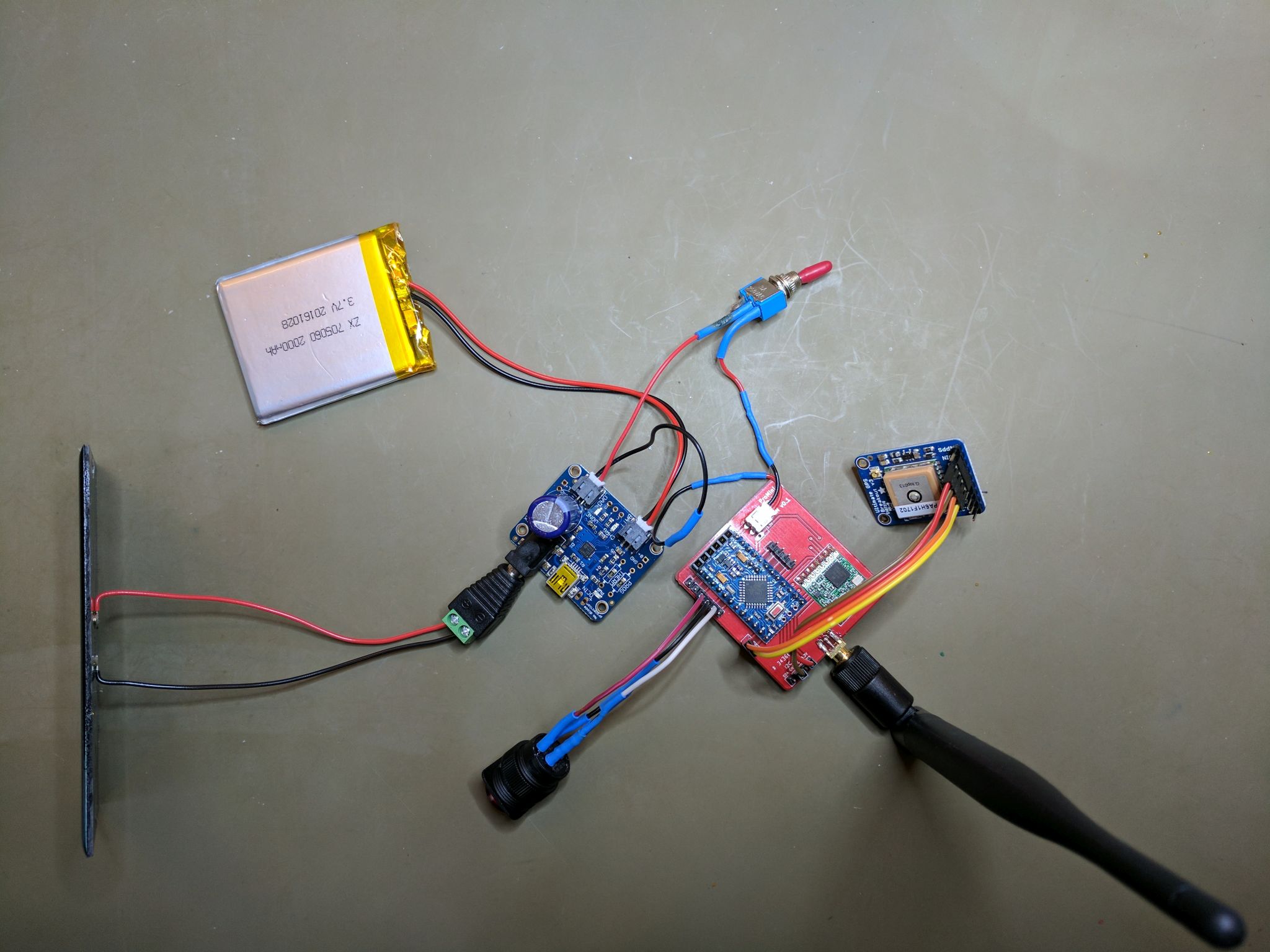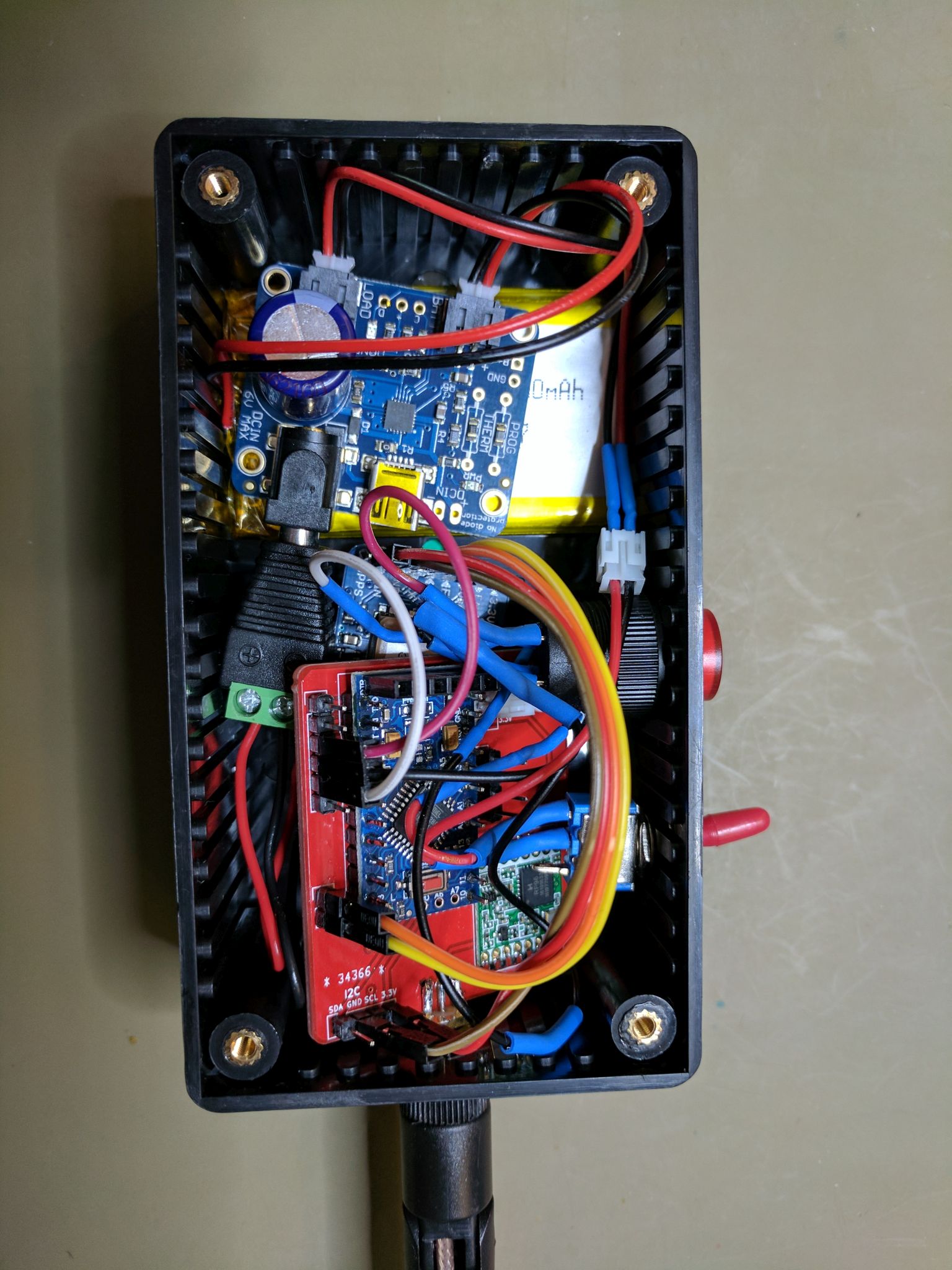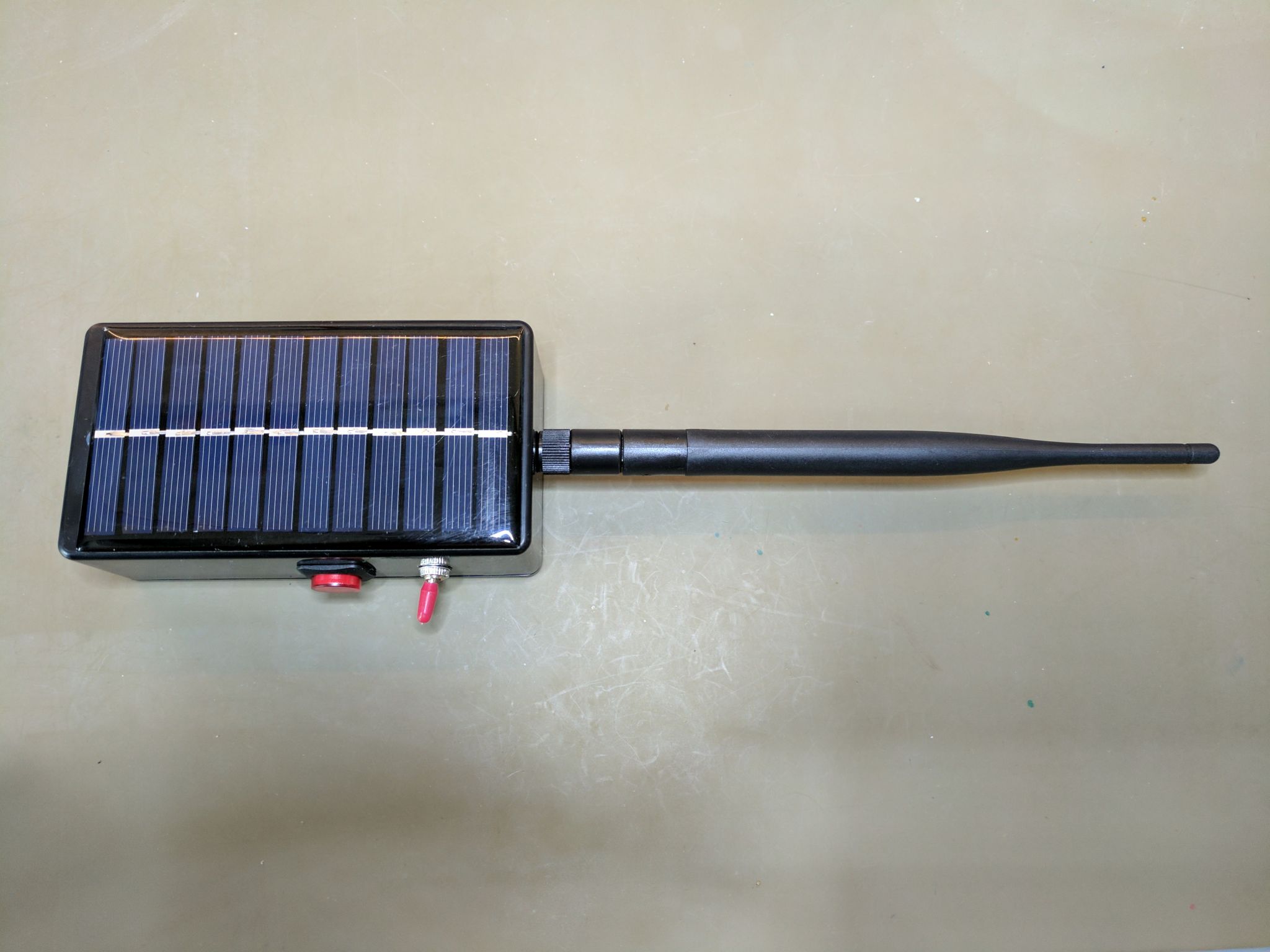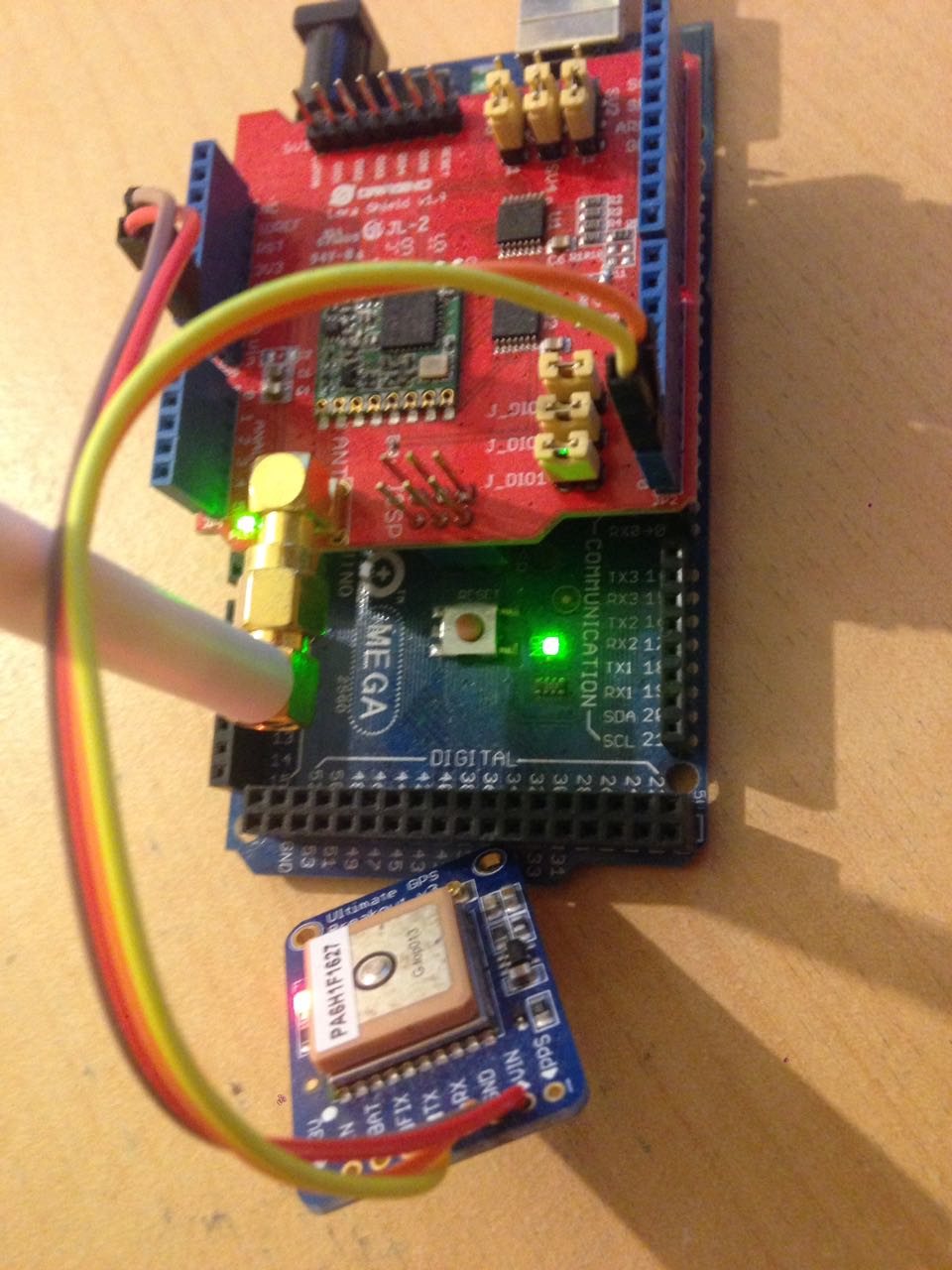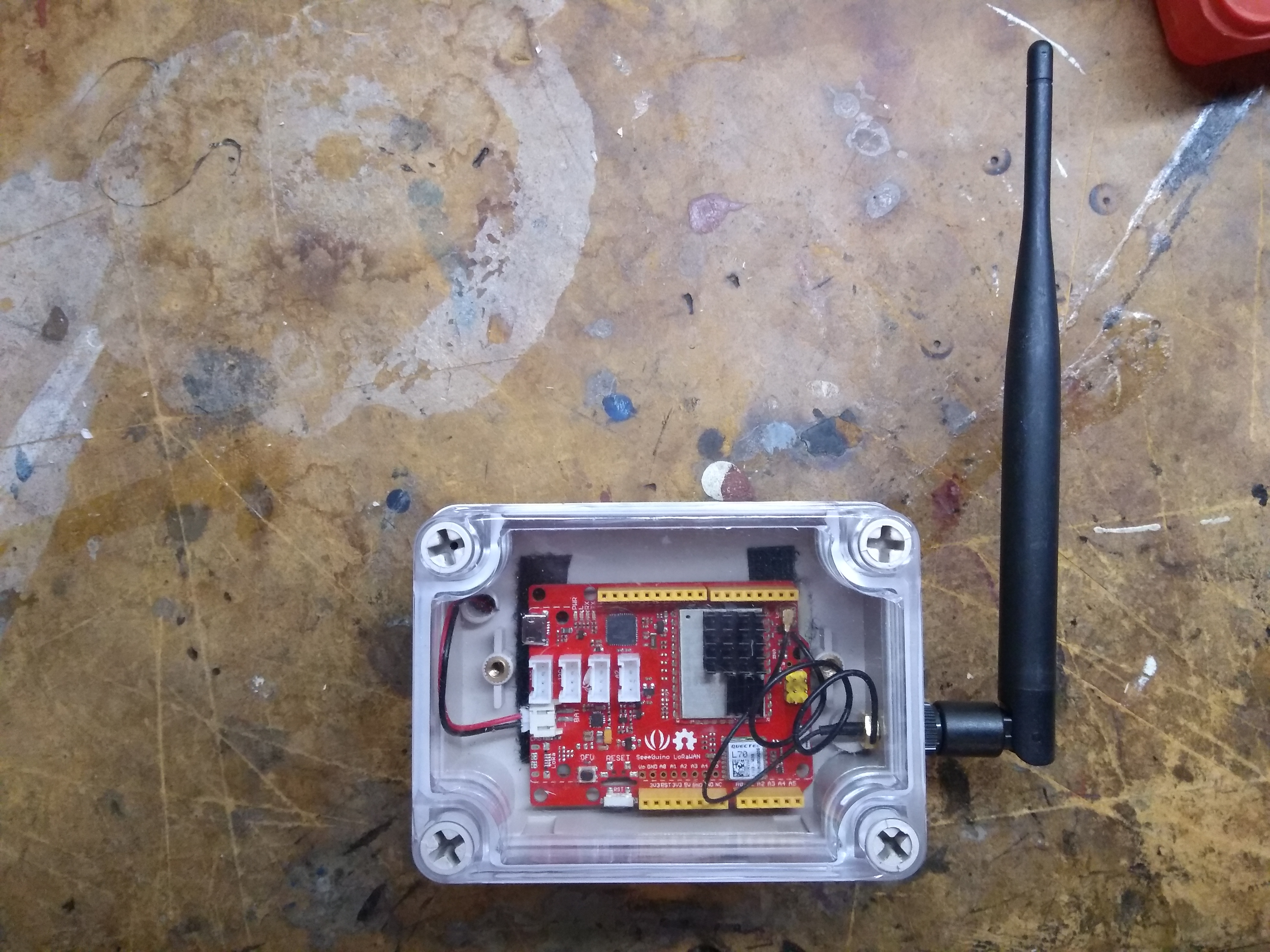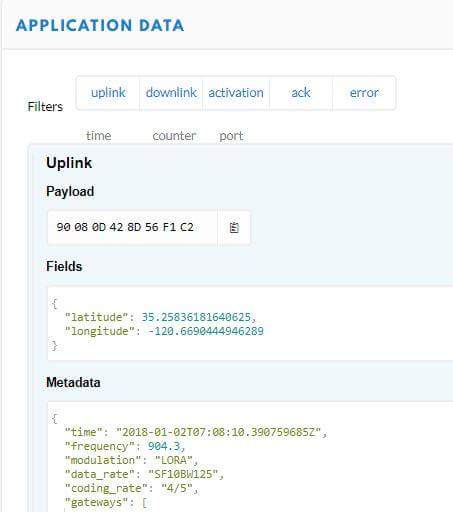UPDATE:
It’s working, but it outputs bullshit. See below
Okay so here is my script:
//DEBUGGING
#define DEBUG
#define DEBUG_XL
//Includes
#include <lmic.h>
#include <hal/hal.h>
#include <SPI.h>
#include <SoftwareSerial.h>
#include <TinyGPS.h>
//LoRaWAN credentials
#ifdef CREDENTIALS
static const u1_t NWKSKEY[16] = NWKSKEY1;
static const u1_t APPSKEY[16] = APPSKEY1;
static const u4_t DEVADDR = DEVADDR1;
#else
static const u1_t NWKSKEY[16] = { 0x0C, 0x3F, 0x0A, 0x47, 0xF7, 0xEE, 0x23, 0xAC, 0xC2, 0x9E, 0x38, 0x29, 0x25, 0x29, 0x88, 0x30 };
static const u1_t APPSKEY[16] = { 0x93, 0x35, 0xC9, 0x49, 0x15, 0xC1, 0xF8, 0x2B, 0x54, 0x3A, 0x8E, 0x7F, 0x93, 0x61, 0xD9, 0x30 };
static const u4_t DEVADDR = 0x2601189E;
#endif
uint8_t mydata[14]; //Extra bytes as buffer to play with
const unsigned message_size =11;
// These callbacks are only used in over-the-air activation, so they are
// left empty here (we cannot leave them out completely unless
// DISABLE_JOIN is set in config.h, otherwise the linker will complain).
void os_getArtEui (u1_t* buf) { }
void os_getDevEui (u1_t* buf) { }
void os_getDevKey (u1_t* buf) { }
//Sendjob
static osjob_t sendjob;
// Schedule TX every this many seconds (might become longer due to duty
// cycle limitations).
const unsigned TX_INTERVAL = 250;
dr_t LMIC_DR_sequence[] = {DR_SF12, DR_SF10, DR_SF7, DR_SF7, DR_SF7, DR_SF7, DR_SF7, DR_SF9, DR_SF7, DR_SF7, DR_SF7, DR_SF7};
int LMIC_DR_sequence_count = 12;
int LMIC_DR_sequence_index = 0;
// Pin mapping Dragino Shield
const lmic_pinmap lmic_pins = {
.nss = 10,
.rxtx = LMIC_UNUSED_PIN,
.rst = 9,
.dio = {2, 6, 7},
};
// TinyGPS object
TinyGPS gps;
//SoftwareSerial pin mapping
SoftwareSerial ss(3, 2); // RX, TX Arduino RX, TX --> GPS TXD, RXD
void onEvent (ev_t ev) {
Serial.print(os_getTime());
Serial.print(": ");
//Error catching
switch(ev) {
case EV_SCAN_TIMEOUT:
Serial.println(F("EV_SCAN_TIMEOUT"));
break;
case EV_BEACON_FOUND:
Serial.println(F("EV_BEACON_FOUND"));
break;
case EV_BEACON_MISSED:
Serial.println(F("EV_BEACON_MISSED"));
break;
case EV_BEACON_TRACKED:
Serial.println(F("EV_BEACON_TRACKED"));
break;
case EV_JOINING:
Serial.println(F("EV_JOINING"));
break;
case EV_JOINED:
Serial.println(F("EV_JOINED"));
//Disable link check validarion (Auto enabled during join, but not supported by TTN);
LMIC_setLinkCheckMode(0);
break;
case EV_RFU1:
Serial.println(F("EV_RFU1"));
break;
case EV_JOIN_FAILED:
Serial.println(F("EV_JOIN_FAILED"));
break;
case EV_REJOIN_FAILED:
Serial.println(F("EV_REJOIN_FAILED"));
break;
break;
case EV_TXCOMPLETE:
Serial.println(F("EV_TXCOMPLETE (includes waiting for RX windows)"));
if (LMIC.txrxFlags & TXRX_ACK)
Serial.println(F("Received ack"));
if (LMIC.dataLen) {
Serial.println(F("Received "));
Serial.println(LMIC.dataLen);
Serial.println(F(" bytes of payload"));
}
// Schedule next transmission
os_setTimedCallback(&sendjob, os_getTime()+sec2osticks(TX_INTERVAL), do_send);
break;
case EV_LOST_TSYNC:
Serial.println(F("EV_LOST_TSYNC"));
break;
case EV_RESET:
Serial.println(F("EV_RESET"));
break;
case EV_RXCOMPLETE:
//Recieved data in ping slot
Serial.println(F("EV_RX_COMPLETE"));
break;
case EV_LINK_DEAD:
Serial.println(F("EV_LINK_DEAD"));
break;
case EV_LINK_ALIVE:
Serial.println(F("EV_LINK_ALIVE"));
break;
default:
//If error != debug then display default value
Serial.println(F("What the fuck is going on"));
break;
}
}
// do_send call is scheduled in event handler
void do_send(osjob_t* j){
// starting version == martijn's version
Serial.println("\ndo_send was called");
// Check if there is not a current TX/RX job running
if (LMIC.opmode & OP_TXRXPEND) {
Serial.println(F("OP_TXRXPEND, not sending"));
} else {
// Prepare upstream data transmission at the next possible time.
// Debug for sending
#ifdef DEBUG
Serial.println(" expected CA DA F? 83 5E 9? 0 ?? ?? " );
Serial.println(" dummy 7F FF FF 7F FF FF 0 0 0 " );
#endif
Serial.print(" mydata[] = [");
Serial.print( mydata[0], HEX );
Serial.print(" ");
Serial.print( mydata[1], HEX );
Serial.print(" ");
Serial.print( mydata[2], HEX );
Serial.print(" ");
Serial.print( mydata[3], HEX );
Serial.print(" ");
Serial.print( mydata[4], HEX );
Serial.print(" ");
Serial.print( mydata[5], HEX );
Serial.print(" ");
Serial.print( mydata[6], HEX );
if (message_size>7) Serial.print(" ");
if (message_size>7) Serial.print( mydata[7], HEX );
if (message_size>8) Serial.print(" ");
if (message_size>8) Serial.print( mydata[8], HEX );
if (message_size>9) Serial.print(" / ");
if (message_size>9) Serial.print( mydata[9], HEX );
if (message_size>10) Serial.print(" ");
if (message_size>10) Serial.print( mydata[10], HEX );
Serial.print("] ");
Serial.print("DR [ ");
Serial.print( LMIC_DR_sequence_index );
Serial.print(" ] = ");
Serial.print( LMIC_DR_sequence[LMIC_DR_sequence_index] );
if ( LMIC_DR_sequence[LMIC_DR_sequence_index]==DR_SF7) Serial.print(" DR_SF7 ");
if ( LMIC_DR_sequence[LMIC_DR_sequence_index]==DR_SF8) Serial.print(" DR_SF8 ");
if ( LMIC_DR_sequence[LMIC_DR_sequence_index]==DR_SF9) Serial.print(" DR_SF9 ");
if ( LMIC_DR_sequence[LMIC_DR_sequence_index]==DR_SF10) Serial.print(" DR_SF10 ");
if ( LMIC_DR_sequence[LMIC_DR_sequence_index]==DR_SF11) Serial.print(" DR_SF11 ");
if ( LMIC_DR_sequence[LMIC_DR_sequence_index]==DR_SF12) Serial.print(" DR_SF12 ");
Serial.print("Data =");
Serial.println(mydata[0]);
Serial.println(mydata[1]);
Serial.println(mydata[2]);
Serial.println(mydata[3]);
Serial.println(mydata[4]);
Serial.println(mydata[5]);
Serial.println(mydata[6]);
Serial.println(mydata[7]);
Serial.println(mydata[8]);
Serial.println(mydata[9]);
Serial.println(mydata[10]);
// Set data rate and transmit power for uplink (note: txpow seems to be ignored by the library
// for the ttn mapper always use SF7. For other use cases, SF12 can be used, however that will require 60 mins quiet time,
// according to TTN rules.
LMIC_setDrTxpow(LMIC_DR_sequence[LMIC_DR_sequence_index],14); // Set data rate
LMIC_DR_sequence_index = LMIC_DR_sequence_index + 1;
if (LMIC_DR_sequence_index >= LMIC_DR_sequence_count) {
LMIC_DR_sequence_index=0;
}
// Send that shit
LMIC_setTxData2(1, mydata, message_size, 0);
Serial.println(" - packet queued");
}
// Next TX is scheduled after TX_COMPLETE event.
}
void lmic_init() {
os_init();
//Reset MAC state
LMIC_reset();
// //EU config
// #if defined(CFG_eu868)
// // Set up the channels for TTN
// // Corresponds to most default EU gateways
// // Good for debugging, doesn't overload frequencies
// LMIC_setupChannel(0, 868100000, DR_RANGE_MAP(DR_SF12, DR_SF7), BAND_CENTI); // g-band
// LMIC_setupChannel(1, 868300000, DR_RANGE_MAP(DR_SF12, DR_SF7B), BAND_CENTI); // g-band
// LMIC_setupChannel(2, 868500000, DR_RANGE_MAP(DR_SF12, DR_SF7), BAND_CENTI); // g-band
// LMIC_setupChannel(3, 867100000, DR_RANGE_MAP(DR_SF12, DR_SF7), BAND_CENTI); // g-band
// LMIC_setupChannel(4, 867300000, DR_RANGE_MAP(DR_SF12, DR_SF7), BAND_CENTI); // g-band
// LMIC_setupChannel(5, 867500000, DR_RANGE_MAP(DR_SF12, DR_SF7), BAND_CENTI); // g-band
// LMIC_setupChannel(6, 867700000, DR_RANGE_MAP(DR_SF12, DR_SF7), BAND_CENTI); // g-band
// LMIC_setupChannel(7, 867900000, DR_RANGE_MAP(DR_SF12, DR_SF7), BAND_CENTI); // g-band
// LMIC_setupChannel(8, 868800000, DR_RANGE_MAP(DR_FSK, DR_FSK), BAND_MILLI); // g2-band
// #elif defined(CFG_us915)
// //USA frequency config
// LMIC_selectSubBand(1);
// #endif
LMIC_setLinkCheckMode(0); //Enable/disable link check validation
// TTN uses SF9 for its RX2 window
LMIC.dn2Dr = DR_SF9;
//Set data rate and transmit power for uplink
LMIC_setDrTxpow(DR_SF12,14);
}
void setup() {
Serial.begin(115200);
Serial.println(F("Starting..."));
//Load the send buffer with dummy location. 0,0 is recognized as dummy by TTN and will therefor not be displayed.
put_gpsvalues_into_sendbuffer( 0,0,0,0);
Serial.println();
Serial.println();
Serial.println("Starting GPS LoRa transmission");
Serial.print("Simple TinyGPS library v. "); Serial.println(TinyGPS::library_version());
Serial.println();
//GPS Serial
ss.begin(9600); //Software serial with GPS module.
lmic_init();
//Start job delayed so system can look for GPS first
os_setTimedCallback(&sendjob, os_getTime()+sec2osticks(20), do_send);
// Set static session parameters.
LMIC_setSession (0x1, DEVADDR, NWKSKEY, APPSKEY);
}
void loop() {
// process the serial feed from GPS module
Serial.println(" ");
Serial.println("Read GPS... ");
char c;
unsigned long start = millis();
do
{
while (ss.available())
{
char c = ss.read();
#ifdef DEBUG_XL
Serial.write(c); // uncomment this line if you want to see the GPS data flowing
#endif
if (gps.encode(c)) // Did a new valid sentence come in?
process_gps_values();
}
} while (millis() - start < 3000); // if too high a value then system wil delay scheduled jobs and the send sequence will take too long
os_runloop_once(); // system picks up scheduled jobs
}
void process_gps_values()
{
// retrieve some usefull values from GPS library
float flat, flon, alt;
unsigned long age;
int hdopNumber;
gps.f_get_position(&flat, &flon, &age); // lat -90.0 .. 90.0 as a 4 byte float, lon -180 .. 180 as a 4 byte float, age in 1/1000 seconds as a 4 byte unsigned long
alt = gps.f_altitude(); // signed float altitude in meters
hdopNumber = gps.hdop(); // int 100ths of a meter
// check if possibly invalid
bool GPS_values_are_valid = true;
if (flat == TinyGPS::GPS_INVALID_F_ANGLE) GPS_values_are_valid = false;
if (flon == TinyGPS::GPS_INVALID_F_ANGLE) GPS_values_are_valid = false;
if (hdopNumber == TinyGPS::GPS_INVALID_HDOP) GPS_values_are_valid = false;
if (age == TinyGPS::GPS_INVALID_AGE) GPS_values_are_valid = false;
if (alt == TinyGPS::GPS_INVALID_F_ALTITUDE) GPS_values_are_valid = false; // if alt, hdop remain giving errors, possibly the GPS character read misses every start few characters of every feed. Solution: make the code lighter so it returns quicker to character read. Or process a bit of buffer while doing other actions, see TinyGPS example.
// if valid, put into buffer
if (GPS_values_are_valid) put_gpsvalues_into_sendbuffer( flat, flon, alt, hdopNumber);
// after init, sendbuffer holds 0,0 lovation; after first fix it will retain the last valid location
Serial.print(".");
//show me something
#ifdef DEBUG
// keep some values out as seems to take performance and/or make for code to miss GPS sentences
unsigned long chars = 0;
//unsigned short sentences = 0, failed = 0;
//uint32_t sat;
//gps.stats(&chars, &sentences, &failed);
//sat = gps.satellites();
Serial.println();
Serial.print("Data: ");
if (GPS_values_are_valid) Serial.print("(valid) ");
if (!GPS_values_are_valid) Serial.print("(** INVALID");
if (flat == TinyGPS::GPS_INVALID_F_ANGLE) {Serial.print(" lat="); Serial.print(flat);}
if (flon == TinyGPS::GPS_INVALID_F_ANGLE) {Serial.print(" lon="); Serial.print(flon);}
if (hdopNumber == TinyGPS::GPS_INVALID_HDOP) {Serial.print(" hdop="); Serial.print(hdopNumber);}
if (age == TinyGPS::GPS_INVALID_AGE) {Serial.print(" age="); Serial.print(age);}
if (alt == TinyGPS::GPS_INVALID_F_ALTITUDE) {Serial.print(" alt="); Serial.print(alt);}
if (!GPS_values_are_valid) Serial.print(" **) ");
Serial.print(" LAT, LON=");
Serial.print( flat, 6);
Serial.print(", ");
Serial.print(flon, 6); // 52.632656, 4.738389
Serial.print(" hdop=");
Serial.print( hdopNumber);
Serial.print(" alt=");
Serial.print( alt );
Serial.print(" AGE=");
Serial.print(age);
//Serial.print(" SAT=");
//Serial.print( sat);
// Serial.print(" CHARS=");
// Serial.print(chars);
//Serial.print(" SENT=");
//Serial.print(sentences);
//Serial.print(" ERR=");
//Serial.print(failed);
Serial.println("");
#endif
#ifdef DEBUG_XL
if (chars == 0)
Serial.println("** No characters from GPS: check wiring **");
else if (age > 5000)
Serial.println("Warning: possible stale GPS data (age over 5 seconds)");
else
Serial.println("GPS Data is fresh (age less than 5 seconds)");
Serial.print("For TTN message LatitudeBinary, LongitudeBinary, altitudeGps, accuracy: ");
Serial.print( LatitudeBinary, HEX);
Serial.print(", ");
Serial.print( LongitudeBinary, HEX );
Serial.print(", ");
Serial.print( altitudeGps, HEX );
Serial.print(", ");
Serial.println( accuracy, HEX );
Serial.println("expected CA DA F. 83 5E 9. 0 .. .. " );
Serial.println(" dummy 7F FF FF 7F FF FF 0 0 0 " );
Serial.print( "mydata[] = ");
Serial.print( mydata[0], HEX );
Serial.print(" ");
Serial.print( mydata[1], HEX );
Serial.print(" ");
Serial.print( mydata[2], HEX );
Serial.print(" ");
Serial.print( mydata[3], HEX );
Serial.print(" ");
Serial.print( mydata[4], HEX );
Serial.print(" ");
Serial.print( mydata[5], HEX );
Serial.print(" ");
Serial.print( mydata[6], HEX );
if (message_size>6) Serial.print(" ");
if (message_size>6) Serial.print( mydata[7], HEX );
if (message_size>7) Serial.print(" ");
if (message_size>7) Serial.print( mydata[8], HEX );
if (message_size>8) Serial.print(" / ");
if (message_size>8) Serial.print( mydata[9], HEX );
if (message_size>9) Serial.print(" ");
if (message_size>9) Serial.print( mydata[10], HEX );
Serial.println("]");
#endif
}
void put_gpsvalues_into_sendbuffer(float flat, float flon, float alt, int hdopNumber)
{
uint32_t LatitudeBinary = ((flat + 90) / 180) * 16777215;
uint32_t LongitudeBinary = ((flon + 180) / 360) * 16777215;
uint16_t altitudeGps = alt; // altitudeGps in meters, alt from tinyGPS is float in meters
if (alt<0) altitudeGps=0; // unsigned int wil not allow negative values and warps them to huge number, needs to be zero'ed
// uint8_t accuracy = hdopNumber*10; // needs to be /10 instead of *10 as per example JP
uint8_t accuracy = hdopNumber/10; // from TinyGPS horizontal dilution of precision in 100ths, TinyGPSplus seems the same in 100ths as per MNEMA string
mydata[0] = ( LatitudeBinary >> 16 ) & 0xFF;
mydata[1] = ( LatitudeBinary >> 8 ) & 0xFF;
mydata[2] = LatitudeBinary & 0xFF;
mydata[3] = ( LongitudeBinary >> 16 ) & 0xFF;
mydata[4] = ( LongitudeBinary >> 8 ) & 0xFF;
mydata[5] = LongitudeBinary & 0xFF;
// altitudeGps in meters into unsigned int
mydata[6] = ( altitudeGps >> 8 ) & 0xFF;
mydata[7] = altitudeGps & 0xFF;
// hdop in tenths of meter
mydata[8] = accuracy & 0xFF;
mydata[9] = 0; // fill up next bytes in buffer, just for play. As-if null terminated string.
mydata[10] = 0xFF; // dummy filler byte
}
Whem I’m outside the lat/lng output in the arduino serial monitor is correct. It also puts the output in a HEX format for ttn to support. But once I convert it back into readable text it outputs someting like this:
CAFC49849B8800000F00FF
wich translates into:
ÊüIÿ
I don’t get it, the console looks all good but the output makes no sense at all.
